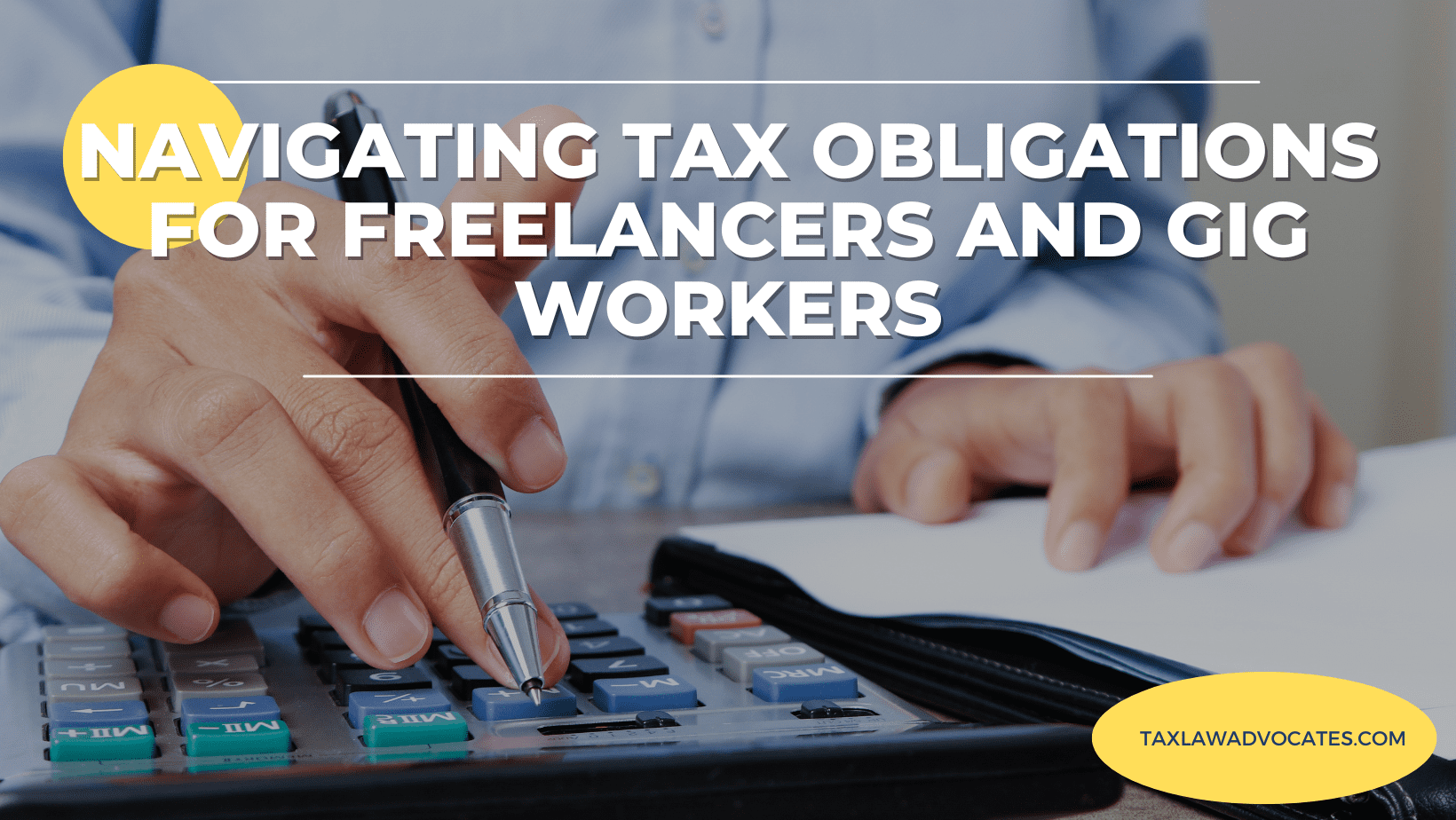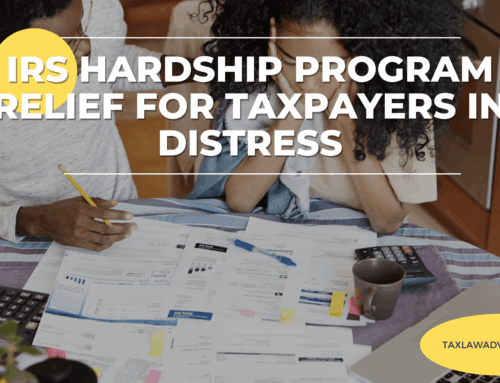The rise of the gig economy has provided millions of workers with the flexibility to work on their own terms. Whether you’re a rideshare driver, an independent contractor, a freelance writer, or selling goods online, the benefits of self-employment are vast. However, these benefits also come with unique tax responsibilities that can be overwhelming without the right guidance.
At Tax Law Advocates, we specialize in helping freelancers and gig workers navigate tax complexities, resolve tax issues, and develop smart tax strategies. If you’re unsure about your tax obligations or need assistance managing your tax debt, call us at 855-612-7777 or visit taxlawadvocates.com for expert help.
Who Qualifies as a Gig Worker?
Gig work refers to any income earned through short-term, on-demand jobs, often facilitated through online platforms or personal contracts.
🔹 Driving for rideshare or delivery services (Uber, Lyft, DoorDash)
🔹 Renting out property on Airbnb or Vrbo
🔹 Selling products through online marketplaces like Etsy or eBay
🔹 Running errands or providing professional services through platforms like TaskRabbit or Fiverr
🔹 Freelance work in writing, graphic design, consulting, and more
If you earn $400 or more from self-employment in a tax year, you are required to file a tax return, even if this is a side job or part-time work.
Understanding Your Tax Filing Requirements
Unlike traditional employees, freelancers and gig workers do not have taxes automatically withheld from their income. This means you’re responsible for tracking income, calculating your tax liability, and ensuring you pay the necessary taxes on time.
Self-Employment Tax
If you work for yourself, you must pay self-employment tax, which includes Social Security and Medicare taxes.
- Self-employment tax rate: 15.3% (12.4% for Social Security + 2.9% for Medicare)
- 💡 Tip: You can deduct the employer-equivalent portion of self-employment taxes (7.65%) when calculating your adjusted gross income.
Quarterly Estimated Tax Payments: What You Need to Know
Since taxes aren’t automatically withheld, freelancers and gig workers are required to make quarterly estimated tax payments to the IRS.
When Are Estimated Taxes Due?
✅ April 15 (for income earned January 1 – March 31)
✅ June 15 (for income earned April 1 – May 31)
✅ September 15 (for income earned June 1 – August 31)
✅ January 15 (following year) (for income earned September 1 – December 31)
How to Calculate and Pay Estimated Taxes
To determine your estimated tax payments, use:
📌 Form 1040-ES, Estimated Taxes for Individuals
📌 IRS Withholding Calculator to adjust estimated amounts
💡 Tip: If you also have a W-2 job, you can adjust your withholdings using Form W-4 to cover some of your self-employment tax obligations.
Maximizing Deductions for Freelancers and Gig Workers
Freelancers and gig workers have access to numerous tax deductions that can significantly reduce their taxable income.
Common Deductions for Gig Workers
✔ Home Office Deduction: If you work from home, you may qualify for a home office deduction, provided the space is used exclusively for business.
✔ Vehicle Expenses: If you use your car for business purposes, you can deduct mileage or actual expenses (gas, repairs, insurance).
✔ Internet & Phone Costs: If you use your internet or phone for business, you can deduct a portion of the expenses.
✔ Supplies & Equipment: Anything you buy for your business—laptops, cameras, software, or office supplies—may be deductible.
✔ Marketing & Advertising: Business cards, website hosting, paid ads, and promotional materials are all tax-deductible. ✔ Health Insurance Premiums: If you’re self-employed and pay for your own health insurance, you may be able to deduct your premiums.
💡 Tip: Keep detailed records of all your business expenses and receipts to justify deductions in case of an audit.
Forms You’ll Need to File as a Freelancer
Freelancers and independent contractors must report all income and expenses on their tax returns. Here are the key forms:
📌 Form 1040 – Individual Tax Return
📌 Schedule C (Form 1040) – Profit or Loss from Business
📌 Schedule SE (Form 1040) – Self-Employment Tax
📌 Form 1099-NEC – Issued by clients who pay you more than $600
💡 Tip: Even if you don’t receive a 1099-NEC, you’re still required to report all income earned.
What Happens If You Can’t Pay Your Tax Bill?
Many gig workers struggle with tax debt due to the unpredictability of income. Fortunately, the IRS provides several tax relief options:
1. IRS Installment Agreement
If you can’t pay your full tax bill, you can set up a payment plan with the IRS.
- Short-term plan: Up to 180 days (no setup fee)
- Long-term plan: Monthly payments for debts over $50,000 ($31–$225 setup fee)
2. Offer in Compromise (OIC)
This allows you to settle your tax debt for less than you owe, but you must prove financial hardship.
3. Currently Not Collectible (CNC) Status
If you’re facing extreme financial hardship, the IRS may pause collection efforts, preventing liens or levies.
4. Penalty Abatement
You may qualify for penalty relief if you have a valid reason for not paying taxes on time (e.g., illness, natural disaster).
💡 How Tax Law Advocates Can Help: Our experts specialize in negotiating affordable payment plans, reducing penalties, and protecting gig workers from IRS enforcement actions.
Why You Should Work with Tax Law Advocates
Gig workers and freelancers have complex tax situations that require expert guidance. At Tax Law Advocates, we help independent contractors:
✔ Develop a Tax Strategy: We’ll help you plan for taxes so you’re never caught off guard.
✔ Resolve Tax Debt Issues: If you owe back taxes, we’ll negotiate with the IRS on your behalf.
✔ Maximize Deductions: We ensure you’re claiming all eligible deductions to reduce your taxable income.
✔ Protect Your Assets: If you’re facing tax liens or levies, we take action to protect your income and property.
🔹 Call Tax Law Advocates today at 855-612-7777 for a free consultation or visit taxlawadvocates.com to learn how we can help you stay compliant while keeping more of your hard-earned money.
Final Thoughts
Freelancers and gig workers must be proactive about managing their tax obligations. From making estimated payments to claiming deductions, understanding your responsibilities can prevent costly penalties and tax debt.
Don’t navigate these challenges alone—Tax Law Advocates is here to help. Contact us today and secure your financial future while staying compliant with the IRS!






